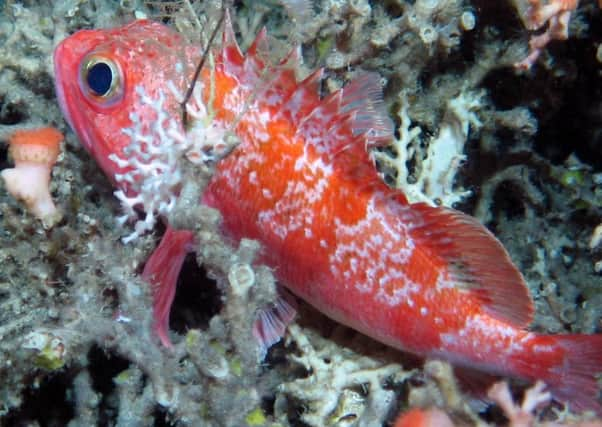Scotland's deep-sea coral reefs in danger from climate change


Academic at the University of Edinburgh have been studying the cold-water coral Lophelia pertusa, which forms elaborate reefs up to 35m high that provide vital habitat for species such as sharks, crabs and conger eels.
The seas around Scotland are home to a number of these slow-growing reefs, which survive without sunlight at depths of 200m to 1km.
Advertisement
Hide AdAdvertisement
Hide AdPopulations are maintained by tiny, fragile larvae that drift and swim on ocean currents, travelling hundreds of miles between reefs where they attach and begin to grow.
Coral bushes can live for up to 1,000 years, but their slow rate of growth – about 1mm per year – means they are highly vulnerable if damaged.
But the researchers believe changes to winter weather conditions in the North Atlantic, brought on by global warming, could threaten the long-term survival of the protected coral and upset important ecosystems that support a wide variety of marine species.
A colony near Rockall, on the 1,000m-tall extinct undersea volcano known as Rosemary Bank seamount, is the main link between reefs off Scotland’s east and west coasts.
Ecologists fear damage to this particular reef could have wider implications, leaving populations isolated and more susceptible to environmental and man-made threats.
The team used computer models to simulate the migration of larvae across vast stretches of ocean in order to discover how weather changes could affect the long-term survival of Lophelia pertusa in the North Atlantic.
They found that deviation in average winter conditions in western Europe, a predicted effect of climate change, could put populations at risk.
Ocean currents, influenced by shifting wind patterns, could drive larvae away from key sites in a new network set out to help safeguard the coral.
Advertisement
Hide AdAdvertisement
Hide AdDr Alan Fox, of the university’s School of GeoSciences, said: “We can’t track larvae in the ocean, but what we know about their behaviour allows us to simulate their epic journeys, predicting which populations are connected and which are isolated.
“In less well connected coral networks populations become isolated and cannot support each other, making survival and recovery from damage more difficult.”
Corals have also been found to thrive on oil and gas platforms in the North Sea and west of Shetland.
It’s hoped this may help bridge a gap in the MPA network between populations in the Atlantic and along the coast of Norway, helping to maintain genetic diversity and maximise resilience to the changing environment.
The study was carried out in collaboration with Heriot-Watt University through a Daphne Jackson fellowship and as part of the EU-funded Atlas project.
Colleague Professor Murray Roberts, coordinator of the Atlas project, added: “Scotland’s seabed plays a unique role as a stepping stone for deep-sea Atlantic species.”